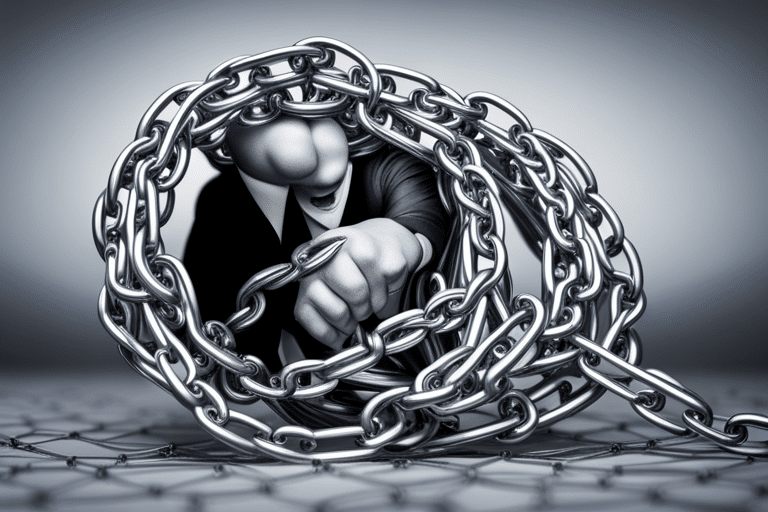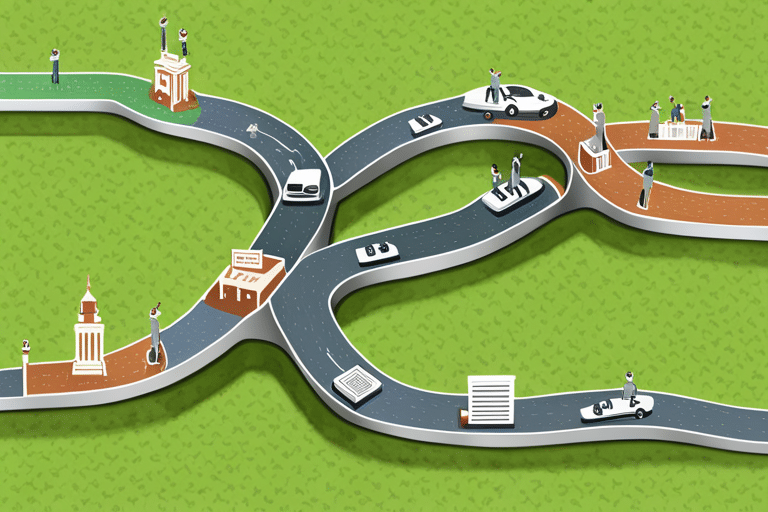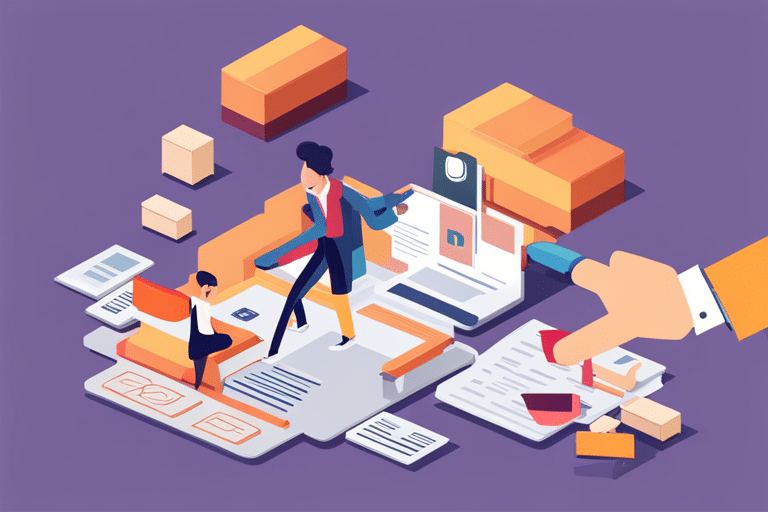Are you feeling overwhelmed by a mountain of debt, like trying to climb Mt. Everest with no gear? Well, fear not! In this article, we’re going to demystify the world of debt consolidation and show you how it works.
We’ll break down the pros and cons so you can make an informed decision.
So grab your climbing boots and let’s conquer this financial challenge together!
Key Takeaways
- Debt consolidation combines multiple debts into one manageable payment, simplifying your life and reducing the number of payments and due dates.
- Debt consolidation often comes with lower interest rates, allowing more money to go towards paying off the principal balance and saving money.
- Timely payments on consolidated loans can improve your credit score over time.
- While debt consolidation may initially lower your credit score, responsible financial behavior and timely payments can gradually recover your credit score.
Understanding Debt Consolidation

Understanding debt consolidation can help you manage your finances more effectively. It’s like having a superhero come to your rescue, swooping in to save the day and bring order to the chaos of multiple debts. With debt consolidation, you can combine all your debts into one manageable payment, making it easier to keep track of and pay off what you owe.
There are different ways to consolidate your debt. One option is getting a personal loan from a bank or credit union. This allows you to pay off all your outstanding debts with one loan, leaving you with just one monthly payment. Another option is using a balance transfer credit card. With this method, you transfer all your existing balances onto one card with low or no interest for a specific period.
The benefits of debt consolidation are aplenty. First and foremost, it simplifies your life by reducing the number of payments and due dates you have to remember. It also often comes with lower interest rates, helping you save money in the long run. Plus, when you make regular payments on time, it improves your credit score.
Benefits of Debt Consolidation

One of the major advantages of debt consolidation is that it can simplify your monthly payments. Instead of juggling multiple bills and due dates, you can combine all your debts into one single payment. This not only saves you time but also ensures that you won’t miss any payments, which could negatively impact your credit score.
So, let’s dive into the benefits of debt consolidation:
-
Lower interest rates: By consolidating your debts, you may be able to secure a lower interest rate than what you were paying before. This means more of your money goes towards paying off the principal balance rather than interest charges.
-
Reduced stress: Say goodbye to the overwhelming feeling of drowning in debt. Debt consolidation can provide a sense of relief and peace of mind as it simplifies your financial obligations.
-
Improved cash flow: With a consolidated loan, you may have more disposable income each month. This extra cash can be put towards savings or other important financial goals.
-
Faster payoff: Debt consolidation allows you to create a structured repayment plan with fixed monthly payments. As a result, you can pay off your debts faster and become debt-free sooner.
-
Enhanced credit score: Timely payments on your consolidated loan can positively impact your credit score over time, leading to better borrowing opportunities in the future.
Drawbacks of Debt Consolidation

So, you’ve explored the benefits of debt consolidation and are feeling pretty confident about it. But before you dive headfirst into this financial adventure, let’s talk about a few things that might give you pause.
First off, potential credit score impact. While consolidating your debts can help simplify your payments, it may also have an effect on your credit score.
Secondly, limited debt forgiveness. Unfortunately, consolidation doesn’t magically make all your debts disappear. You’ll still be responsible for paying them back in full.
And lastly, long-term repayment commitment. Consolidating your debts often means extending the overall repayment period, so be prepared to stay committed for the long haul.
Potential Credit Score Impact
The potential credit score impact of debt consolidation is a major concern for many individuals. But fear not, my friend! Let’s demystify this topic and put your worries to rest. Here are some key points to consider:
- Debt consolidation can initially lower your credit score due to the new loan application and closing existing accounts.
- However, as you make timely payments on your consolidated loan, your credit score can gradually recover.
Keep in mind that alternative options like credit counseling or debt management plans may have a lesser impact on your credit score.
It’s important to carefully evaluate which debt consolidation method suits your financial situation best.
Remember, with patience and responsible financial behavior, you can bounce back from any temporary dip in your credit score.
Limited Debt Forgiveness
Don’t worry, my friend, limited debt forgiveness is an option worth considering. When it comes to managing your debts, there are various alternatives available to provide you with some much-needed relief. Debt forgiveness options can help alleviate the burden of overwhelming financial obligations and give you a fresh start.
One popular debt relief alternative is negotiating with your creditors for partial or full forgiveness of your outstanding balance. This can be a viable option if you find yourself unable to repay the entirety of what you owe. By reaching out and explaining your situation, you may be able to come to an agreement that reduces or eliminates a portion of your debt.
However, it’s important to note that limited debt forgiveness should not be seen as a quick fix or a way to avoid taking responsibility for your financial obligations. It is just one tool in your arsenal when it comes to managing debt. In the long run, committing to a structured repayment plan may be necessary in order to regain control over your finances and rebuild your credit.
Transitioning into the next section about ‘long-term repayment commitment’, understanding the importance of developing a sustainable plan will ultimately lead you towards financial freedom and stability. So let’s explore how creating a long-term repayment commitment can help you achieve these goals and overcome any lingering financial challenges.
Long-Term Repayment Commitment
So, you’ve learned about limited debt forgiveness and how it may help alleviate some of your financial burden. But what happens when you decide to pursue debt consolidation? Brace yourself, because this is a long-term financial commitment. However, don’t worry! With the right repayment strategies, you can conquer your debts and take control of your financial future.
Here are some tips to keep in mind:
-
Create a budget: Track your income and expenses to ensure you have enough funds for monthly payments.
-
Prioritize high-interest debts: Focus on paying off those with the highest interest rates first.
-
Consider balance transfers: Move high-interest credit card balances to cards with lower interest rates.
-
Explore debt management plans: These programs may negotiate lower interest rates or reduced monthly payments.
-
Stay disciplined: Avoid accumulating new debts while working towards eliminating existing ones.
Now that you’re armed with these repayment strategies, let’s explore whether debt consolidation is right for you.
Is Debt Consolidation Right for You

Are you wondering if debt consolidation is the right choice for you? Well, fret not my friend! Let’s dive into the wonderful world of debt consolidation and explore its benefits and different types of programs.
First off, let’s talk about the perks of consolidation. By combining all your debts into one single payment, you can simplify your financial life and say goodbye to juggling multiple due dates. Not only does this make managing your finances a breeze, but it can also help lower your interest rates and monthly payments. Plus, it’s a great way to regain control over your debt situation and pave the path towards financial freedom.
Now, let’s take a look at the different types of consolidation programs out there. You’ve got options like personal loans, balance transfers, home equity loans, or even enrolling in a debt management plan through a credit counseling agency. Each program has its own unique features and advantages depending on your specific needs.
Different Ways to Consolidate Your Debts

So, you’re looking for different ways to consolidate your debts, huh? Well, let’s dive right in!
First up, we’ve got the classic Loan Vs. Credit Cards debate – which one is better for consolidating your debts?
Then, we’ll explore the Home Equity Option – a nifty way to tap into the value of your home to pay off those pesky creditors.
And lastly, we’ll uncover the wonders of Balance Transfer Credit – where you can transfer your high-interest credit card balances to a lower interest rate card and save some serious cash.
Ready to tackle these options head-on? Let’s get started!
Loan Vs. Credit Cards
If you’re considering debt consolidation, you might be wondering whether a loan or credit cards are the better option for your situation. Well, fear not! We’re here to break it down for you in the most delightful way possible. So grab a cup of tea and let’s dive in!
Here’s a handy-dandy bullet list to help you compare loan options and interest rates:
- Loans: These can offer lower interest rates compared to credit card APRs.
- Credit Cards: Some cards may offer introductory 0% APRs but watch out for high regular rates.
- Loan Options: Personal loans, home equity loans, or even borrowing from your retirement account.
- Interest Rates: Fixed-rate loans provide stability while variable-rate loans may fluctuate over time.
- Credit Card Rewards: If you love earning points or cashback, credit card rewards could be tempting.
Home Equity Option
To explore the home equity option for debt consolidation, consider if you’re a homeowner and have built up equity in your property. If you find yourself buried under a mountain of high-interest debt, utilizing your home’s equity through a home equity loan or mortgage refinancing could be an effective solution. It allows you to consolidate all your debts into one manageable monthly payment while taking advantage of lower interest rates.
Let’s take a closer look at how these options work:
| Home Equity Loan | Mortgage Refinancing |
|---|---|
| Borrow against the equity in your home | Replace your existing mortgage with a new one |
| Fixed interest rate and term | Can result in lower monthly payments |
| Lump sum disbursement | Additional funds can be used for debt consolidation |
Both options have their pros and cons, so it’s important to weigh them carefully before making a decision. Remember, mastery over your finances is within reach!
Balance Transfer Credit
A balance transfer credit card can be a useful tool for consolidating and managing high-interest debt. It allows you to transfer your existing credit card balances onto one card, usually with a lower interest rate.
But before you dive into the world of balance transfers, here are some things to keep in mind:
- Look for a card with a 0% introductory APR period.
- Consider any balance transfer fees that may apply.
- Make sure you have a plan to pay off the transferred balance before the introductory period ends.
- Keep track of your spending habits to avoid falling into more debt.
- Use the new card responsibly and make timely payments.
Pros and Cons of Debt Consolidation Loans

You should consider the pros and cons of debt consolidation loans before making a decision. Sure, it might sound like a magical solution to all your financial problems, but let’s take a closer look at what you’re getting into.
On the bright side, debt consolidation loans can bring some serious benefits to the table. First off, they simplify your life by combining all your debts into one single monthly payment. No more juggling multiple due dates or worrying about missing payments. Plus, with a lower interest rate than what you were previously paying, you can save some serious dough in the long run.
However, there are also some drawbacks to be aware of. For starters, taking out a debt consolidation loan means taking on more debt. You’ll need to make sure that you don’t fall back into bad spending habits and rack up even more debt while trying to pay off your existing loans.
Another thing to consider is that not all debts are suitable for consolidation. If you have high-interest credit card debt or payday loans, consolidating them might not be the best option as it could end up costing you more in the long run.
Exploring Debt Consolidation Programs

Hey there! Ready to dive into the world of debt consolidation programs? Well, get excited because we’re about to explore the awesome benefits that come with consolidating your debts.
Not sure if you qualify? Don’t worry, we’ll break down the eligibility criteria for you.
And hold on tight because we’ll also be discussing the different types of consolidation programs out there.
Get ready to tackle those debts like a pro!
Benefits of Consolidation
Consider the advantages of debt consolidation, such as lower interest rates and simplified repayment plans. Debt consolidation can be a game-changer when it comes to managing your finances. Here are some benefits that will make you want to do a happy dance:
-
Lower interest rates: Say goodbye to those sky-high interest rates on multiple loans. With debt consolidation, you can get a lower rate, which means more money in your pocket.
-
Simplified repayment: Instead of juggling multiple due dates and payment amounts, debt consolidation allows you to combine all your debts into one monthly payment. It’s like having a personal finance wizard take care of everything for you!
-
Improved credit score: By making regular payments on time, debt consolidation can help boost your credit score over time.
-
Stress relief: No more sleepless nights worrying about bills and missed payments. Debt consolidation brings peace of mind knowing that you have a clear plan to tackle your debts.
-
Faster debt payoff: With lower interest rates and simplified repayment plans, you’ll be able to pay off your debts faster than ever before.
Now that we’ve explored the advantages of debt consolidation, let’s dive into the eligibility criteria explained…
Eligibility Criteria Explained
If you’re wondering whether you meet the eligibility criteria for debt consolidation, here’s what you need to know. Debt consolidation can be a great option if you have multiple debts and want to simplify your payments. To qualify, you typically need to have a stable income and a decent credit score. However, each lender may have their own specific requirements, so it’s important to do your research before applying.
To give you an idea of what lenders might look for in terms of eligibility requirements and documentation needed, here’s a handy table:
| Eligibility Requirements | Documentation Needed |
|---|---|
| Stable Income | Recent pay stubs |
| Good Credit Score | Credit report |
| Debt-to-Income Ratio | Bank statements |
Remember that these are just general guidelines. It’s always best to check with individual lenders for their specific criteria. So gather those pay stubs, pull up your credit report, and start your journey towards financial freedom!
Types of Consolidation Programs
Now that you know if you’re eligible for debt consolidation, let’s dive into the different consolidation options and how to find the right program for you.
It’s like going on a shopping spree, but instead of clothes or gadgets, you’re shopping for financial freedom!
Here are some consolidation options to consider:
- Balance transfer credit cards: These allow you to transfer high-interest credit card balances onto a single card with a lower interest rate.
- Personal loans: You can take out a loan from a bank or online lender to pay off your debts, leaving you with one monthly payment.
- Home equity loans: If you own a home, this type of loan allows you to borrow against your home’s value and use the funds to pay off your debts.
- Debt management plans: Non-profit credit counseling agencies can help negotiate lower interest rates and consolidate your debts into one manageable payment.
- Debt consolidation companies: These companies offer programs that combine all your debts into one monthly payment.
By exploring these different options, you’ll be well on your way to finding the perfect program for consolidating your debt.
But wait! Before we move on, let’s also discuss another important topic: debt consolidation vs. debt settlement.
Debt Consolidation Vs. Debt Settlement

Debt consolidation is a more structured approach compared to debt settlement. So, you’re struggling with your debts and you’re searching for a way out. Well, fear not my friend, because I’m here to shed some light on the world of debt solutions!
When it comes to finding alternatives to debt settlement, debt consolidation is definitely worth considering.
Now, picture this: instead of dealing with multiple creditors and confusing payment schedules every month, debt consolidation offers you the chance to combine all your debts into one convenient monthly payment. It’s like having a personal finance fairy godmother who waves her magic wand and simplifies your financial life.
With debt consolidation, you can kiss goodbye to those pesky collection calls and never-ending late fees. Plus, it’s a great way to regain control of your finances without damaging your credit score too much. By working with a reputable consolidation company or taking out a loan specifically designed for this purpose, you can create an affordable repayment plan that suits your budget.
So why choose debt consolidation over debt settlement? Well, while both options aim to help you get rid of your debts faster and more efficiently, debt consolidation takes a more structured approach. Instead of negotiating with individual creditors like in the settlement process (which can be quite stressful), consolidating your debts allows you to simplify everything into one manageable monthly payment.
Remember though – no matter which option you choose – it’s essential to carefully consider the pros and cons before making any decisions about how best to tackle your debts. But hey, don’t fret! With some research and guidance from professionals in the field, you’ll be well on your way towards mastering this whole ‘debt thing’ in no time!
The Role of Credit Counseling in Debt Consolidation

Credit counseling can provide valuable guidance and support when it comes to navigating the process of debt consolidation. It’s like having a knowledgeable friend by your side, helping you unravel the complexities of managing your finances.
Here are five reasons why credit counseling is an essential tool in your journey towards financial freedom:
-
Importance of financial education: Credit counselors are experts in their field who can help you understand the ins and outs of debt consolidation. They will equip you with the knowledge and skills necessary to make informed decisions about your money.
-
Role of budgeting in debt management: A credit counselor will work with you to create a realistic budget that aligns with your lifestyle and goals. By sticking to this budget, you’ll be able to manage your debts more effectively and avoid falling back into old spending habits.
-
Personalized advice: Every individual’s financial situation is unique, and credit counselors understand that. They will take the time to assess your specific needs and develop a plan tailored to suit you best.
-
Negotiating with creditors: Dealing directly with creditors can be intimidating and overwhelming. With credit counseling, however, professionals will negotiate on your behalf, helping you secure lower interest rates or extended repayment terms.
-
Emotional support: Debt consolidation can be emotionally taxing, but credit counselors offer emotional support throughout the process. They’re there to listen, encourage, and remind you that there’s light at the end of the tunnel.
How Debt Consolidation Affects Your Credit Score

So, you’ve finally taken the leap and consolidated your debt – congratulations!
But what does this mean for your credit score? Well, my friend, the impact on your credit score can vary depending on how you handle your new consolidated loan.
In this discussion, we’ll delve into the nitty-gritty of how debt consolidation can affect your credit score and explore any long-term effects that may come into play.
Credit Score Impact
One thing to consider is how debt consolidation might affect your overall credit score. While it can be a powerful tool for rebuilding credit, it’s important to understand the potential impact on your score.
Here are some key points to keep in mind:
-
Positive Payment History: Debt consolidation allows you to make consistent payments, which can help improve your credit score over time.
-
Lower Credit Utilization: By consolidating multiple debts into one, you can reduce your overall credit utilization ratio, which is good for your score.
-
Potential Temporary Dip: Initially, your credit score may dip slightly due to opening a new account or closing old ones. However, this should be temporary and will likely improve in the long run.
-
Avoiding Late Payments: With a single payment to manage, there’s less chance of missing due dates and incurring late fees that could damage your credit.
-
Credit Mix Improvement: If you consolidate different types of debt (e.g., credit cards and loans), it can diversify your credit mix and potentially boost your score.
Understanding these factors will allow you to make an informed decision about whether debt consolidation is right for you.
Now let’s explore the long-term effects on your credit.
Long-Term Credit Effects
Understanding how debt consolidation can impact your credit score in the long term is crucial when deciding whether it’s the right choice for you. So, let’s dive into the fascinating world of credit utilization!
You see, when you consolidate your debts, it can actually improve your credit score over time. How? Well, by reducing your overall debt and streamlining your payments with a single loan or credit card, you’re showing lenders that you’re responsible and capable of managing your debts effectively.
Plus, by implementing smart debt management strategies like making timely payments and keeping your credit utilization low, you’ll be on track to boost that credit score even more. It’s like giving your financial health a makeover!
Steps to Take Before Consolidating Your Debts

Before you consider consolidating your debts, there are a few steps you should take. Evaluating consolidation options and weighing the pros and cons can help ensure that debt consolidation is the right choice for you. Here’s what you need to do:
-
Assess your current financial situation: Take a close look at your debts, income, and expenses. Understanding where you stand financially will help you determine if debt consolidation is necessary.
-
Calculate your total debt: Add up all of your outstanding balances to get a clear picture of how much you owe. This will give you an idea of how much money you’ll need to consolidate.
-
Research different consolidation methods: There are various ways to consolidate debt, such as balance transfers, personal loans, or home equity loans. Explore these options and choose the one that best suits your needs.
-
Compare interest rates and fees: Different lenders offer different rates and fees for consolidation. Shop around and find the most affordable option that will save you money in the long run.
-
Create a budget plan: Before committing to debt consolidation, make sure you have a solid budget plan in place. This will help prevent future financial troubles and ensure that you can afford your monthly payments.
Taking these steps will set you up for success when considering debt consolidation. Now, let’s delve into some common mistakes to avoid in this process so that we can make sure everything goes smoothly for you!
Common Mistakes to Avoid in Debt Consolidation

Let’s take a look at some common mistakes to avoid when consolidating your debts. Debt consolidation can be a great way to simplify your financial life and get on track towards debt freedom. But, like any financial decision, there are pitfalls you need to watch out for. So, grab your pen and paper, because here are some tips for success!
First off, one of the most common mistakes people make is not doing their homework. Don’t just jump into the first debt consolidation option you come across. Take the time to research different lenders, compare interest rates, and understand the terms and conditions.
Another mistake is relying solely on debt consolidation without changing your spending habits. Consolidating your debts won’t magically make them disappear if you continue to rack up new ones. It’s important to address the root cause of your debt and make necessary lifestyle changes.
Lastly, be wary of hidden fees and charges. Some lenders may lure you in with low interest rates but hit you with unexpected costs down the line. Read all the fine print before signing any agreement.
Evaluating the Costs of Debt Consolidation

So, you’ve learned about the common mistakes to avoid in debt consolidation. Good job! Now, let’s move on to the next step – evaluating the costs of debt consolidation. This is an important part of the process because it helps you compare your options and make an informed decision.
Here are some things to consider:
-
Interest rates: Look at the interest rates offered by different lenders and calculate how much you’ll be paying over time.
-
Fees: Check for any upfront fees or hidden charges that may come with consolidating your debts.
-
Loan term: Consider how long it will take you to repay the consolidated loan and whether it aligns with your financial goals.
-
Monthly payments: Evaluate if the monthly payments fit within your budget and if they are lower than what you’re currently paying.
-
Total cost: Add up all the costs associated with each option, including interest, fees, and any other expenses involved.
Tips for Successfully Managing Consolidated Debts

To successfully manage your consolidated debts, it’s important to create a detailed budget and stick to it. But hey, don’t worry! Budgeting doesn’t have to be boring or restrictive. In fact, think of it as a game where the goal is successful repayment and financial freedom!
First things first, take a good look at your income and expenses. Track every penny that comes in and goes out. This will help you identify areas where you can cut back or make adjustments. Maybe that daily latte can become an occasional treat instead.
Next, prioritize your debts based on interest rates and due dates. Make sure you’re paying the minimum on all debts to avoid any late fees or penalties. Then, focus on tackling one debt at a time by allocating extra funds towards it while still making regular payments on others.
Now for the fun part – finding creative ways to save money! Look for budget-friendly alternatives like cooking at home instead of eating out, using coupons or apps for discounts, and exploring free entertainment options like parks or local events.
Frequently Asked Questions
What Are Some Alternatives to Debt Consolidation?
If you’re not sold on debt consolidation, there are a couple of alternatives you can consider. Debt management and debt settlement are two options that might help you get your finances back on track.
How Long Does the Debt Consolidation Process Typically Take?
You’re probably wondering how long it takes to consolidate your debt. Well, the debt consolidation timeline can vary, but typically it involves a few steps like assessing your financial situation and finding a reputable lender.
Can I Still Use Credit Cards After Consolidating My Debts?
After consolidating your debts, you can still use credit cards responsibly. However, it’s important to understand the impact of debt consolidation on your credit card utilization and make smart choices moving forward.
Will Debt Consolidation Lower My Monthly Payments?
Yes, debt consolidation can lower your monthly payments. By combining multiple debts into one, you may qualify for a lower interest rate and have more manageable payments. Check the eligibility criteria to see if it’s right for you!
Can Debt Consolidation Help Improve My Credit Score?
Debt consolidation can indeed help improve your credit score. By combining multiple debts into one, you can simplify payments and make them more manageable. To further boost your credit, focus on making timely payments and reducing your overall debt.
Conclusion
Congratulations! You’ve made it to the end of this demystifying journey through debt consolidation.
Now, before you go off and conquer your financial woes, let me ask you one last question: are you ready to take control of your debts and pave the way for a brighter financial future? I hope so!
Remember, debt consolidation can be a powerful tool to simplify your payments, lower interest rates, and ultimately save you money.
So go ahead, make a plan, avoid those common mistakes, and watch as your debts become a thing of the past. You’ve got this!

